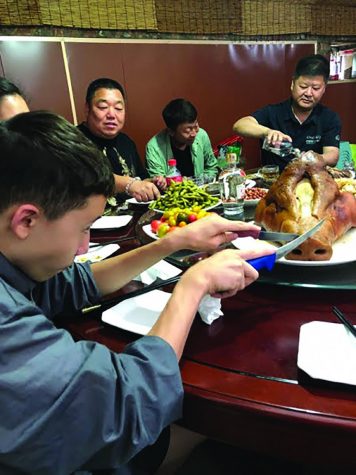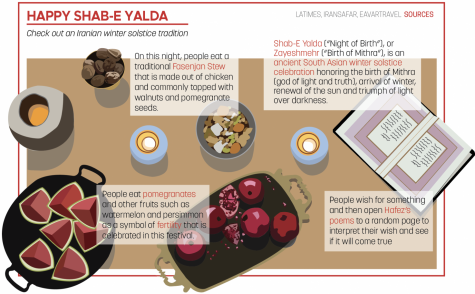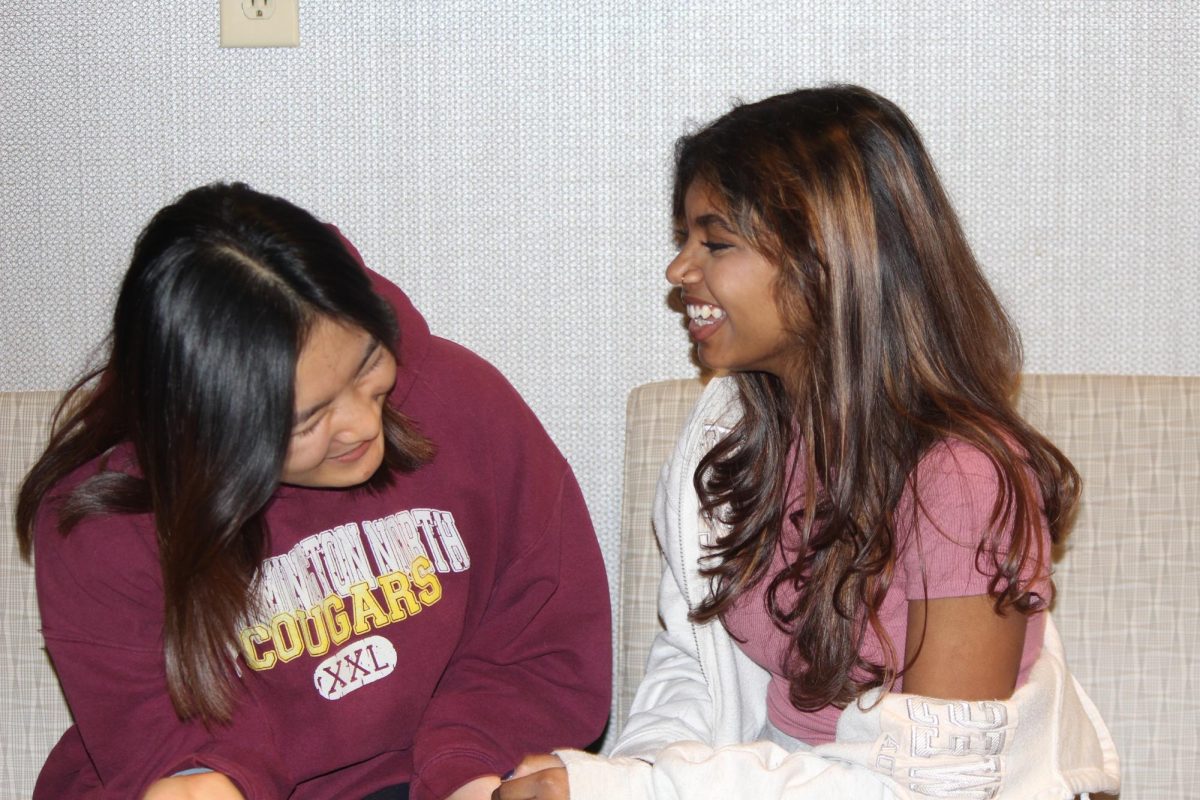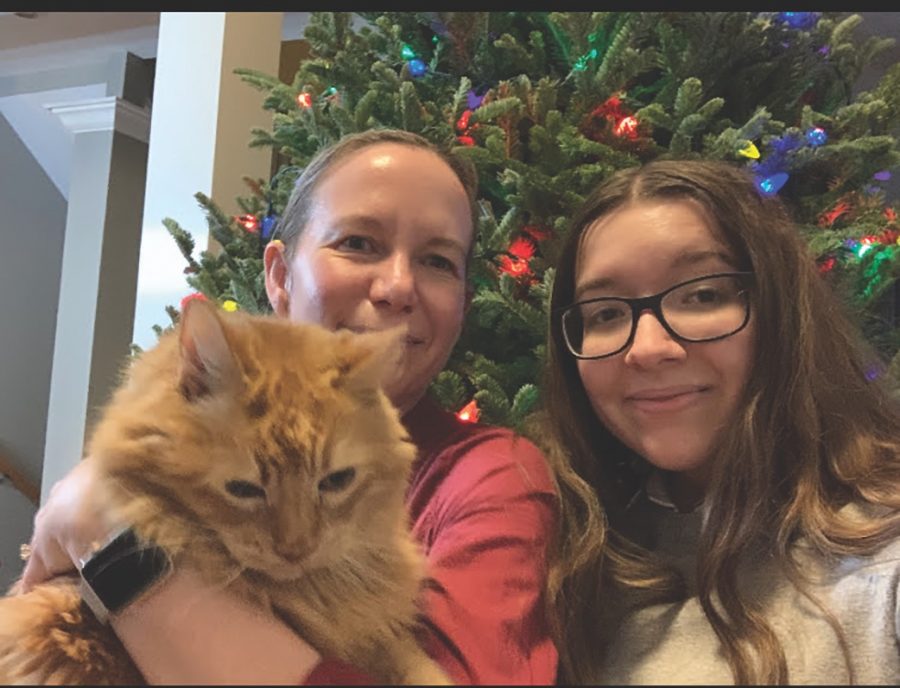While it might seem unusual to celebrate the winter solstice, the shortest day and darkest time of the year, many students at this school look forward to holidays around this time and have already begun preparing for celebration.
One such student is sophomore Aeneas Hoffman, who celebrates the Chinese winter solstice festival, Dongzhi, with his family.
“(On) my mom’s side of the family, we are very rich in Chinese culture. To celebrate the solstice we participate in the Dongzhi festival. Basically, we celebrate the season’s turning point towards the warmer, lighter days of spring. It’s essentially a time during the depths of winter to enjoy a hearty fortifying family meal that raises hopes for spring’s arrival,” Hoffman said. “The (Dongzhi festival) marries the winter solstice with nature’s harmonious balance of yin and yang energy. From this point forward Dongzhi—which basically means the extreme of winter—and the negative Yin quantities of darkness and cold give way to the more positive Yang qualities of light and warmth.”
Hoffman is not the only student who is looking forward to the winter solstice, which this year falls on Dec. 21 on the Western Calendar. Sophomore Shreya Krishnan said she too is excited to celebrate the Winter Solstice through the Hindu festival Pongal with her family.
While many see Pongal as the celebration of the Winter Solstice and the start of the new harvest, it has multiple interpretations, even within the Hindu community. Some see it as an Indian Thanksgiving while others see it as an auspicious Hindu day.
Krishan said she celebrates it as the Winter Solstice. “At home the way we celebrate is by making pongal, a south Indian rice dish. There are two varieties: a more savory kind and a more sweet kind, so at home we make both of those and I really like that food. We give that as an offering to God and then we do a small pooja and then eat the pongal.”
Social studies teacher Ryan Ringenberg said he plans on spending the winter solstice with his family and the comforts of his home this year due to the pandemic.
He said, “It’s very interesting to hear the numerous ways different ethnicities and cultures celebrate what is usually the darkest and gloomiest time of the year. Personally, I celebrate the winter solstice with my family but it’s always nice to hear what other people are up to on this day.”
Sophomore Catherine Byrne also participates in a winter tradition.
“Normally, around the time of the winter solstice we celebrate Christmas by getting a Christmas Tree and going to church and opening presents,” she said. “And then normally the day after Christmas we always go to Montana to go skiing, but we probably are not going to go this year because of COVID.”

Hoffman said he has seen differences in the ways the two sides of his family celebrate the winter solstice.
“Unlike my mom’s side of the family, for my dad’s side, the culture isn’t nearly as rich with the celebration of the solstice. It’s fun trying to incorporate our dad into the festival and teach him Chinese culture, but in the end all that matters is everyone is going to have a good time and enjoy the food,” he said.
Despite the cold and dark of winter, students at this school have still found a reason to celebrate, even at the peak of the COVID-19 pandemic.
Krishnan said, “I think part of the reason people celebrate the winter solstice is because the fact it is the darkest day of the year means that there is a light in the future that is coming and so celebrating the winter solstice is welcoming that light to come back in.”
Hoffman said he believes the winter solstice is a time to celebrate and be thankful for all you have.
“I see the winter solstice as an opportunity to just relive and relish the experiences of my ancestors because it’s not every day we get to enjoy a hearty meal. Especially during the cold winters and harsh times during the Han Dynasty, a meal like this would be very greatly cherished. So I think for me I really need to cherish this time of the year especially for this reason,” he said.
Byrne said she agreed. “For me, the winter solstice signifies the end of the year. I feel starting Thanksgiving, we start to look back at it more and all the memories that we’ve had,” she said. “It’s more of a time of making yourself happier. Looking back at your life and realizing how much you have and how happy you are for it.”
Ringenberg said, “No matter your culture, ethnicity or religion, I think you should spend the winter solstice remembering the past year’s events, especially this year with everything that has happened, and be thankful for making it through.”
Hoffman said, “I find the winter solstice special because it represents the darkest point of the year and I think everybody regardless of cultural differences should come and spend time together to ultimately lighten the day up and to hope for a better and brighter spring to come.”




















![Joseph Broman, Mu Alpha Theta sponsor, grades tests for his honors precalculus/trigonometry class. Broman said, “I’m retiring from the Math Club next year and I’m just going to do Mu Alpha Theta so I can focus on that one and we can do more [speaker series] first semester.”](https://hilite.org/wp-content/uploads/2024/03/IMG_9502-1200x900.jpg)











![British royalty are American celebrities [opinion]](https://hilite.org/wp-content/uploads/2024/03/Screenshot-2024-03-24-1.44.57-PM.png)




















![Review: “The Iron Claw” cannot get enough praise [MUSE]](https://hilite.org/wp-content/uploads/2024/04/unnamed.png)
![Review: “The Bear” sets an unbelievably high bar for future comedy shows [MUSE]](https://hilite.org/wp-content/uploads/2024/03/unnamed.png)
![Review: “Mysterious Lotus Casebook” is an amazing historical Chinese drama [MUSE]](https://hilite.org/wp-content/uploads/2024/03/0.webp)
![Thea Bendaly on her Instagram-run crochet shop [Biz Buzz]](https://hilite.org/wp-content/uploads/2024/03/IMG_0165-1200x838.jpg)
![Review: Sally Rooney’s “Normal People,” is the best book to read when you are in a time of change [MUSE]](https://hilite.org/wp-content/uploads/2024/03/20047217-low_res-normal-people.webp)
![Review in Print: Maripaz Villar brings a delightfully unique style to the world of WEBTOON [MUSE]](https://hilite.org/wp-content/uploads/2023/12/maripazcover-1200x960.jpg)
![Review: “The Sword of Kaigen” is a masterpiece [MUSE]](https://hilite.org/wp-content/uploads/2023/11/Screenshot-2023-11-26-201051.png)
![Review: Gateron Oil Kings, great linear switches, okay price [MUSE]](https://hilite.org/wp-content/uploads/2023/11/Screenshot-2023-11-26-200553.png)
![Review: “A Haunting in Venice” is a significant improvement from other Agatha Christie adaptations [MUSE]](https://hilite.org/wp-content/uploads/2023/11/e7ee2938a6d422669771bce6d8088521.jpg)
![Review: A Thanksgiving story from elementary school, still just as interesting [MUSE]](https://hilite.org/wp-content/uploads/2023/11/Screenshot-2023-11-26-195514-987x1200.png)
![Review: When I Fly Towards You, cute, uplifting youth drama [MUSE]](https://hilite.org/wp-content/uploads/2023/09/When-I-Fly-Towards-You-Chinese-drama.png)
![Postcards from Muse: Hawaii Travel Diary [MUSE]](https://hilite.org/wp-content/uploads/2023/09/My-project-1-1200x1200.jpg)
![Review: Ladybug & Cat Noir: The Movie, departure from original show [MUSE]](https://hilite.org/wp-content/uploads/2023/09/Ladybug__Cat_Noir_-_The_Movie_poster.jpg)
![Review in Print: Hidden Love is the cute, uplifting drama everyone needs [MUSE]](https://hilite.org/wp-content/uploads/2023/09/hiddenlovecover-e1693597208225-1030x1200.png)
![Review in Print: Heartstopper is the heartwarming queer romance we all need [MUSE]](https://hilite.org/wp-content/uploads/2023/08/museheartstoppercover-1200x654.png)























![Review: Ladybug & Cat Noir: The Movie, departure from original show [MUSE]](https://hilite.org/wp-content/uploads/2023/09/Ladybug__Cat_Noir_-_The_Movie_poster-221x300.jpg)

![Review: Next in Fashion season two survives changes, becomes a valuable pop culture artifact [MUSE]](https://hilite.org/wp-content/uploads/2023/03/Screen-Shot-2023-03-09-at-11.05.05-AM-300x214.png)
![Review: Is The Stormlight Archive worth it? [MUSE]](https://hilite.org/wp-content/uploads/2023/10/unnamed-1-184x300.png)




